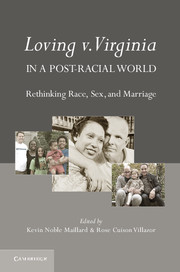Book contents
- Frontmatter
- Contents
- About the Contributors
- Acknowledgments
- Foreword
- Introduction Loving v. Virginia in a Post-Racial World
- Part One Explaining Loving v. Virginia
- Part Two Historical Antecedents to Loving
- Part Three Loving and Interracial Relationships: Contemporary Challenges
- 6 The Multiracial Epiphany, or How to Erase an Interracial Past
- 7 Love at the Margins
- 8 The Crime of Loving
- 9 What’s Loving Got to Do with It?
- 10 Fear of a “Brown” Planet
- Part Four Considering the Limits of Loving
- Part Five Loving Outside the U.S. Borders
- Part Six Loving and Beyond: Marriage, Intimacy, and Diverse Relationships
- Permission Granted
- Index
- References
8 - The Crime of Loving
Loving, Lawrence, and Beyond
Published online by Cambridge University Press: 05 July 2012
- Frontmatter
- Contents
- About the Contributors
- Acknowledgments
- Foreword
- Introduction Loving v. Virginia in a Post-Racial World
- Part One Explaining Loving v. Virginia
- Part Two Historical Antecedents to Loving
- Part Three Loving and Interracial Relationships: Contemporary Challenges
- 6 The Multiracial Epiphany, or How to Erase an Interracial Past
- 7 Love at the Margins
- 8 The Crime of Loving
- 9 What’s Loving Got to Do with It?
- 10 Fear of a “Brown” Planet
- Part Four Considering the Limits of Loving
- Part Five Loving Outside the U.S. Borders
- Part Six Loving and Beyond: Marriage, Intimacy, and Diverse Relationships
- Permission Granted
- Index
- References
Summary
The past is never dead. It’s not even past.
– William FaulknerThe Charleston of my youth had only one interracial couple. In South Carolina, nobody paid them much attention, but everybody noticed and knew of them. It was like they were ignored and scrutinized at the same time. I never saw anyone talk to them, even to say, “How d’you do?” But as far as I know, no one ever yelled at them, or threw anything at them, or was outright mean to them. They were students at the College of Charleston, and I think most folks thought of them as transients/hippies/not-from-around-here, so that probably helped. And at least the white person in the couple was the guy, and homely looking at that. That probably helped too.
This occurred post–Loving v. Virginia, but back then, I had never heard of the case. I’m sure my elders had, or at least knew that interracial marriage was no longer prohibited as a matter of law. They certainly knew it was possible – popular culture showed the possibilities of intermingling. There was Tom and Helen Willis on The Jeffersons, for one. And everybody knew that Diana Ross had married a white man. But being possible someplace in New York or in Hollywood wasn’t the same thing as being possible in Charleston, South Carolina. Besides, my elders still remembered how, just a dozen or so years before Loving was decided, a black boy in Mississippi named Emmett Till had been lynched for just whistling at a white woman. They remembered, going even further back, that their idol Jack Johnson, the first black heavyweight champion of the world, had been prosecuted under the White-Slave Traffic Act for just taking his white girlfriend across state lines. Nobody in my hometown, or my entire state, as far as I could tell, took Loving as carte blanche to rush to the altar or jump any brooms. Even that one college couple, as far as I know, only dated. But they only stayed four years, long enough to graduate, and I don’t know what they did after.
- Type
- Chapter
- Information
- Loving v. Virginia in a Post-Racial WorldRethinking Race, Sex, and Marriage, pp. 114 - 127Publisher: Cambridge University PressPrint publication year: 2012



